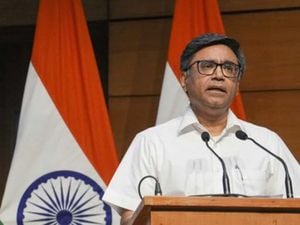In a bold diplomatic move, Dutch Foreign Minister Caspar Veldkamp has called for an investigation into whether Israel is violating the terms of its association agreement with the European Union, particularly in light of the ongoing humanitarian blockade in Gaza. This announcement comes as the situation in the region deteriorates, raising questions about the Netherlands' longstanding support for Israel amidst growing international concerns.
Veldkamp's letter to EU foreign affairs chief Kaja Kallas, sent on May 7, 2025, marks a significant shift in Dutch foreign policy. He argues that Israel's actions in Gaza, including the blockade of essential supplies such as water, food, and medical aid, contravene international humanitarian law and violate Article 2 of the association agreement, which emphasizes human rights and democratic principles.
Oxfam Novib's director Michiel Servaes criticized Veldkamp's actions, describing them as a "diplomatic mouse step" that will not impress Israel or alleviate the suffering of the people in Gaza. He noted that the Dutch population has been urging the government to fundamentally change its stance for a long time, and this response comes too late to make a meaningful impact on Israeli Prime Minister Netanyahu.
Writer and journalist Maurits de Bruijn echoed these sentiments, expressing his dismay at the average Israeli's apparent indifference to the plight of Gazans. He remarked, "If I sensed anything, it was how much the average Israeli closed their eyes to Gaza." De Bruijn criticized the Dutch government's support for Israel, claiming it has allowed for what he describes as genocide in Gaza.
Veldkamp's letter has sparked controversy within the Dutch government, particularly among coalition partners. The populist Party for Freedom (PVV), led by Geert Wilders, expressed outrage at being left in the dark about the letter before its release. Wilders, a staunch supporter of Israel, questioned whether all ministers had been informed and if there was a consensus within the cabinet regarding the letter's contents.
Sources close to Veldkamp defended his decision, citing the government's program, which allows for independent foreign policy actions, especially in cases of severe human rights violations. They emphasized that the cabinet's focus is on alleviating humanitarian needs in Gaza and securing the release of hostages.
During a meeting of EU foreign ministers in Warsaw, Veldkamp plans to propose that the EU collectively investigate Israel's compliance with the association agreement. He stated, "In my opinion, the renewed closure of Gaza for water and food, fuel, and medicines is a violation of Israel's obligations under international humanitarian law and thus of Article 2 of the Association Agreement." This move signals a potential shift in the EU's approach to Israel, as Veldkamp indicated that several EU countries might support such an investigation.
Critics within the Dutch parliament have characterized Veldkamp's actions as too little, too late. Politicians from various parties, including the Christian Union and the Socialist Party, have expressed cautious optimism about the proposal but maintain that it should have been made much earlier. They argue that the humanitarian crisis in Gaza has been escalating for years, and the Dutch government should have taken a firmer stance long ago.
Veldkamp's proposal also includes the suspension of the EU-Israel Action Plan, which governs economic and administrative cooperation between the EU and Israel. This agreement has historically provided Israel with access to the European market, and its suspension could have significant economic repercussions for Israel, which relies heavily on European trade.
As the situation in Gaza continues to worsen, Veldkamp's call for an investigation represents a pivotal moment in Dutch foreign policy. He has faced criticism for the perceived delay in taking a more critical stance against Israel, particularly following the October 7, 2023, attacks by Hamas that resulted in the deaths of 1,200 Israelis. Veldkamp's initial response, echoing that of Prime Minister Rutte, was to affirm Israel's right to defend itself, a stance that has since been challenged by growing evidence of humanitarian violations.
The response from Israel has been notably absent, with officials remaining silent on Veldkamp's letter and the proposed investigation. Observers suggest that Israel views the Netherlands as a loyal ally but may not be swayed by this recent diplomatic initiative.
In the broader context, Veldkamp's actions reflect a growing recognition within Europe of the need to address the humanitarian crisis in Gaza. The EU has faced increasing pressure to hold Israel accountable for its actions, particularly as reports of civilian casualties and destruction mount. Veldkamp's proposal could pave the way for a more unified European response to the situation.
As the Dutch parliament prepares for a debate on the issue, the political landscape in the Netherlands remains divided. While some politicians express support for Veldkamp's initiative, others, like Wilders, vehemently oppose any measures perceived as anti-Israel. This internal conflict highlights the complexities of Dutch foreign policy, particularly in relation to Israel and Palestine.
Looking ahead, Veldkamp's letter may serve as a catalyst for broader discussions about the EU's relationship with Israel and its commitment to upholding human rights. The outcome of the proposed investigation and any subsequent actions taken by the EU will be closely watched by both supporters and critics of Israel's policies in the region.
In conclusion, as the humanitarian crisis in Gaza escalates, Veldkamp's call for an investigation into Israel's compliance with international law marks a significant, albeit contentious, step in Dutch foreign policy. The response from both the Dutch government and the international community will be crucial in shaping the future of EU-Israel relations and addressing the urgent needs of the Palestinian people.





